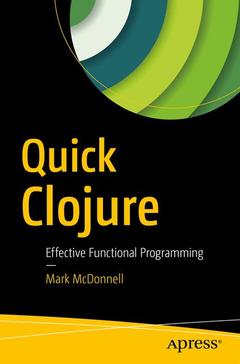Description
Quick Clojure, 1st ed.
Effective Functional Programming
Language: English
Publication date: 08-2017
Support: Print on demand
Support: Print on demand
Description
/li>Contents
/li>Biography
/li>Comment
/li>
Get up to speed with Clojure in this quick and practical primer. You'll learn the nuts and bolts of functional programming, data structures, sequences, destructuring, pattern matching, polymorphism, concurrency, conventions, and more. Author Mark McDonnell talks about organization with namespaces; how to change the language via macros; object-oriented programming; and creating command-line apps. Finally, he shows you how to write Clojure from shell languages and interfaces such as Vim.
After reading and using Quick Clojure, you'll come away with first-hand knowledge and advice on how to quickly adopt, use, and apply Clojure without all the theoretical baggage that bigger books can sometimes bring.
What You'll Learn
- Work with data structures and their syntax
- Discover OOP in Clojure with patterns, polymorphisms, pattern matching, and concurrency
- Use conventions, organization, and namespaces in Clojure
- Create command-line apps
- Build various Clojure projects with the Leiningen IDE tool and framework
Who This Book Is For
Programmers with experience. A Java background would be helpful, but not required.
1. What is Clojure?.- 2. Data Structures and Syntax.- 3. Functional Programming.- 4. Sequences.- 5. Functions.- 6. Destructuring.- 7. Pattern Matching.- 8. Concurrency.- 9. Namespaces.- 10. Macros.- 11. Object Orientation.- 12. Leiningen.- 13. Command Line Applications.- Appendix A: Conventions.- Appendix B: Writing Clojure with Vim.
Mark McDonnell is a Senior Software Engineer at BuzzFeed and was a software developer with BBC and StormCreative. He is a Polyglot programmer with experience in Clojure, Lisp, Vim, Tmax and other scripting languages. He has published books with Apress as well as self-published.
Learn and apply the Clojure programming language Employ OOP in Clojure with patterns, polymorphisms, and concurrency Build Clojure projects with the Leiningen IDE tool and framework
© 2024 LAVOISIER S.A.S.





